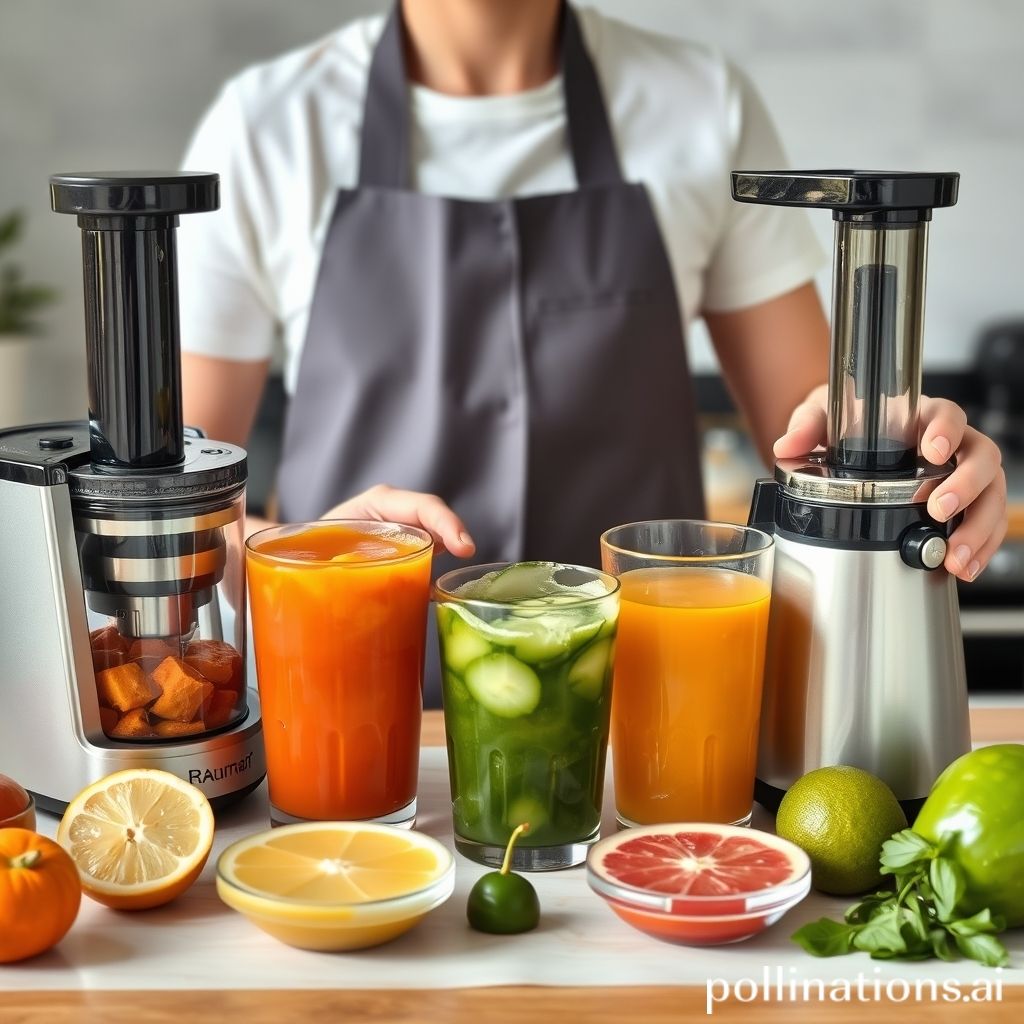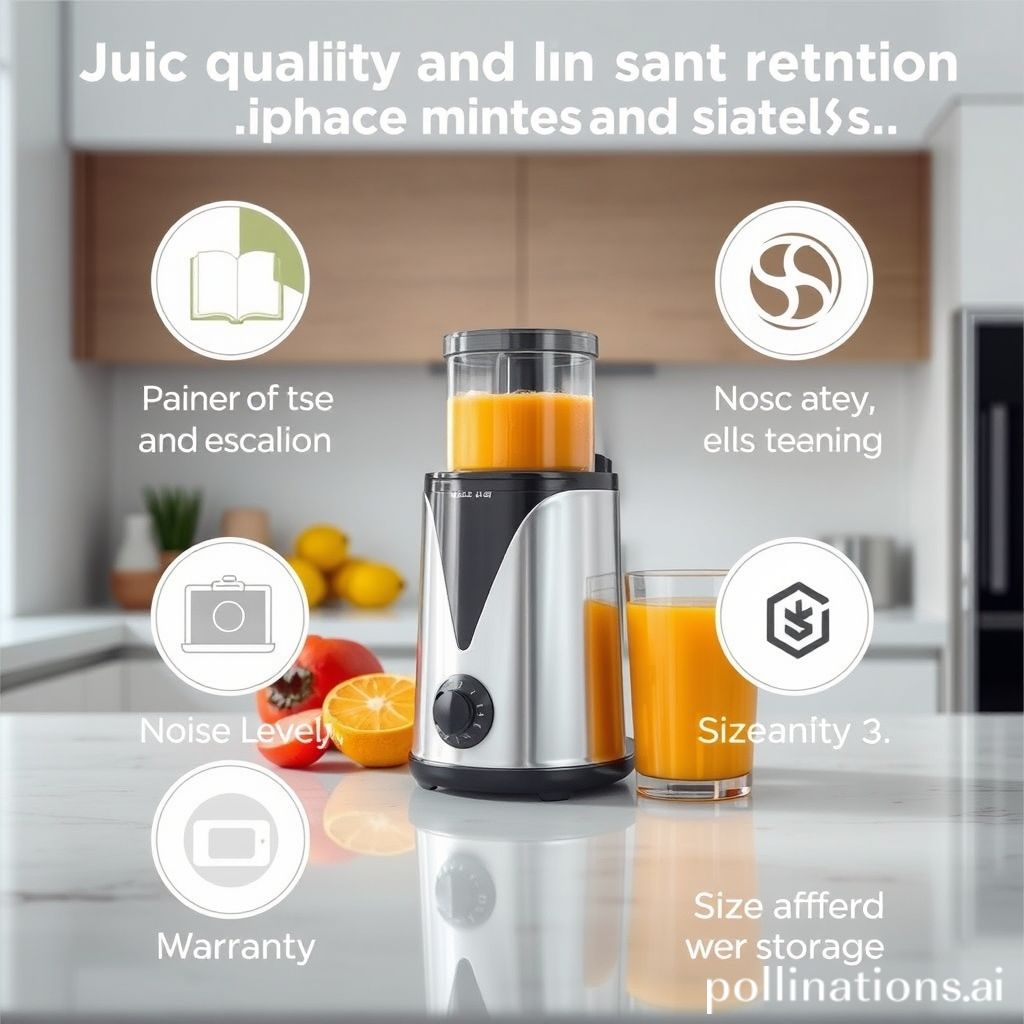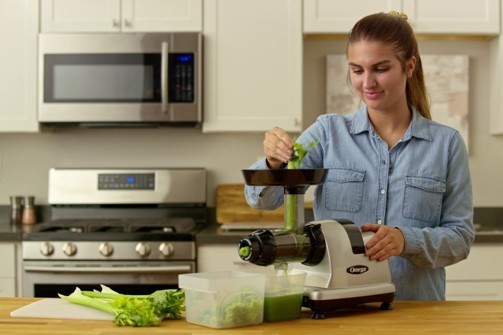Which Juicer Should I Choose?
[su_note note_color=”#fb8e00″ text_color=”#000000″ radius=”12″]
Searching for the perfect juicer that meets your needs and preferences? Wondering which juicer you should choose or buy? Look no further! Many people are seeking guidance and recommendations on selecting the right juicer that suits their specific requirements. With so many options available, it can be overwhelming to make the right choice.
But fret not, this article is here to provide you with all the information and advice you need to find the best juicer for you. Whether you’re a health enthusiast or just looking to incorporate more fresh juices into your diet, we’ve got you covered. Get ready to discover your perfect juicing companion!
[su_box title=”
[/su_box]

Understanding Your Juicing Needs
1. Determining Your Juicing Goals
Before selecting a juicer, it is crucial to identify your juicing goals. Ask yourself what you want to achieve through juicing. Are you aiming to enhance your overall health and well-being? Do you desire to lose weight or detoxify your body? By understanding your goals, you can choose a juicer that effectively meets your needs.
For instance, if your objective is to extract the maximum amount of nutrients from fruits and vegetables, a masticating juicer is a suitable choice. These juicers use a slow and gentle process to extract juice, preserving the enzymes and nutrients. Conversely, if you primarily focus on juicing citrus fruits, a citrus juicer would be more appropriate.
2. Assessing Your Budget
Another crucial factor to consider when selecting a juicer is your budget. Juicers are available in a wide range of prices, from affordable options to high-end models. Assessing your budget will help you narrow down your choices and find a juicer that provides the best value for your money.
Whilst it may be tempting to choose a cheaper juicer, it is important to remember that quality and durability are also essential factors. Investing in a higher-quality juicer may save you money in the long run, as it is likely to last longer and require fewer repairs or replacements.
3. Considering Your Available Time
Time is another aspect to consider when selecting a juicer. Different juicers have varying preparation and cleaning times. If you have a busy schedule and limited time, you may prefer a juicer that is quick to assemble, use, and clean.
Centrifugal juicers are known for their fast juicing process and easy cleanup. They are a convenient option for individuals who are always on the go. In contrast, masticating juicers require more time and effort for preparation and cleaning, but they offer superior juice quality and can handle a wider variety of produce.
[su_highlight background=”#f6b40f”]Expert Tips:
1. Determine your juicing goals to choose the right juicer for your needs.
2. Assess your budget and invest in a quality juicer for long-term savings.
3. Consider your available time and choose a juicer that fits your busy schedule.[/su_highlight]
Types of Juicers
1. Centrifugal Juicers
Centrifugal juicers are favored for their speed and convenience. They operate by using a fast-spinning blade to extract juice from fruits and vegetables.
| Key Features and Benefits | Limitations and Considerations |
|---|---|
|
|
2. Masticating Juicers
Masticating juicers are renowned for their slow and thorough juicing process. They utilize an auger to crush and squeeze the juice out of fruits and vegetables.
| Key Features and Benefits | Limitations and Considerations |
|---|---|
|
|
3. Citrus Juicers
Citrus juicers are specifically designed for extracting juice from citrus fruits like oranges, lemons, and grapefruits.
| Key Features and Benefits | Limitations and Considerations |
|---|---|
|
|
When selecting a juicer, it’s important to consider your specific needs and preferences. Centrifugal juicers are excellent for quick and easy juicing of hard fruits and vegetables. Masticating juicers are ideal for those who want to preserve nutrients and juice leafy greens. Citrus juicers are perfect for individuals who primarily juice citrus fruits.
Factors to Consider When Selecting a Juicer
1. Juice Quality and Retention of Nutrients
When choosing a juicer, it is important to consider the quality of the juice and its ability to retain nutrients. Look for a juicer that utilizes slow masticating or cold press technology, as this helps minimize heat and oxidation, preserving the essential nutrients and enzymes in the juice. Additionally, consider models that offer adjustable settings to control the amount of pulp and extract maximum juice yield.
2. User-Friendliness and Ease of Cleaning
Convenience is key As for using and cleaning a juicer. Opt for a juicer that has a wide feeding chute, allowing you to juice whole fruits and vegetables without the need for pre-cutting. Look for features like a reverse function to prevent clogging and dishwasher-safe parts for effortless cleaning. Choose a juicer with a user-friendly interface and intuitive controls.
3. Noise Level
If noise is a concern for you, consider a juicer with a quiet motor. Look for models that are specifically designed for low noise operation, ensuring a peaceful juicing experience without causing disturbance to others.
4. Durability and Warranty
Investing in a durable juicer is essential for long-term use. Look for juicers made from high-quality materials such as stainless steel or BPA-free plastic. Check for a warranty that covers both the motor and other components, as it provides assurance of product quality and customer support.
5. Size and Storage
The size and storage of the juicer are important considerations, especially if you have limited countertop space. Choose a compact and space-saving juicer that fits well in your kitchen. Consider models with detachable components or built-in cord storage for easy handling and storage.

Popular Juicer Brands and Models
1. Brand A – Model X
Brand A offers the Model X juicer, which is highly regarded for its exceptional performance and durability. This juicer is equipped with advanced features that make juicing easy. Here are some of its key features and benefits:
- Powerful Motor: The Model X juicer has a strong motor for efficient juicing of fruits and vegetables.
- Wide Chute: With a wide chute, you can insert whole fruits and vegetables without pre-cutting them, saving time and effort.
- Easy to Clean: The Model X juicer is easy to clean with its detachable parts that can be washed and assembled easily.
Customer reviews of the Brand A – Model X juicer have been overwhelmingly positive. Users have praised its performance, ease of use, and the quality of the juice it produces. Many have also highlighted its durability and long-lasting performance.
2. Brand B – Model Y
Brand B offers the Model Y juicer, which is a popular choice among juicing enthusiasts. This juicer is packed with features that make juicing convenient and efficient. Here are some of its notable features and benefits:
- Multiple Speed Settings: The Model Y juicer offers various speed settings, allowing you to adjust the juicing speed based on the type of fruits or vegetables you are juicing.
- Quiet Operation: Unlike many other juicers, the Model Y operates quietly, ensuring a peaceful juicing experience without disturbing others.
- Compact Design: The Model Y juicer has a compact design that takes up minimal counter space, making it ideal for small kitchens.
Customer reviews of the Brand B – Model Y juicer have been highly positive. Users have praised its performance, versatility, and the quality of the juice it produces. Many have also appreciated its user-friendly design and ease of cleaning.
| Brand | Model |
|---|---|
| Brand A | Model X |
| Brand B | Model Y |
[su_note note_color=”#ea2e0c” text_color=”#ffffff” radius=”8″]Extra Tips: Find the perfect juicer by considering your juicing needs, budget, and the features that matter most to you.[/su_note]
Comparing Juicers and Making a Decision
1. Pros and Cons of Centrifugal Juicers
Centrifugal juicers are known for their speed and efficiency in extracting juice from fruits and vegetables. They work by using a high-speed spinning blade to separate the juice from the pulp. One of the main advantages of centrifugal juicers is their fast juicing process, making them ideal for those who are always on the go. Nonetheless, they tend to produce less juice and can generate more foam compared to other types of juicers. They are also not very effective in juicing leafy greens and wheatgrass.
2. Pros and Cons of Masticating Juicers
Masticating juicers, also known as slow juicers or cold press juicers, use a slow and gentle squeezing action to extract juice. They are highly efficient in extracting juice from a wide variety of fruits, vegetables, and leafy greens. One of the main advantages of masticating juicers is their ability to retain more nutrients and enzymes in the juice due to the low heat generated during the juicing process. Nonetheless, they are generally slower and require more time for juicing. They are also typically more expensive compared to centrifugal juicers.
3. Pros and Cons of Citrus Juicers
Citrus juicers are specifically designed for juicing citrus fruits like oranges, lemons, and grapefruits. They come in different types, including manual hand press juicers and electric juicers. One of the main advantages of citrus juicers is their ability to extract juice efficiently from citrus fruits, producing a high yield of juice with minimal effort. They are also generally more affordable compared to other types of juicers. Nonetheless, they are limited in their functionality and cannot juice other types of fruits or vegetables.
4. Choosing the Right Juicer for Your Needs
When selecting the appropriate juicer for your needs, take into consideration factors such as the type of produce you plan to juice, your budget, and your juicing preferences. If you primarily juice hard fruits and vegetables and value speed and convenience, a centrifugal juicer might be the right choice for you. If you prioritize nutrient retention and versatility in juicing a wide range of produce, a masticating juicer would be more suitable. If you mainly juice citrus fruits and want a simple and affordable option, a citrus juicer would be the best fit. Evaluate your needs and preferences carefully to make an informed decision.
Conclusion
In the realm of selecting the perfect juicer for your needs, it’s essential to consider your specific requirements and preferences. By Mastering the different types of juicers available and their features, you can make an informed decision.
Whether you prioritize convenience, efficiency, or versatility, there is a juicer out there that suits your needs. Take the time to research and read customer reviews to find the best juicer that fits seamlessly into your lifestyle and helps you achieve your health and wellness goals. So, don’t hesitate any longer – start your juicing journey today!
Faq about Juicers
FAQ 1: What is the difference between a centrifugal juicer and a masticating juicer?
Centrifugal juicers use high-speed spinning blades to extract juice quickly. They are great for juicing hard fruits and vegetables but may struggle with leafy greens. Conversely, masticating juicers use a slow, crushing motion to extract juice, making them more efficient for leafy greens and yielding higher quality juice. They are generally more expensive than centrifugal juicers.
FAQ 2: Can I juice leafy greens with a citrus juicer?
No, citrus juicers are specifically designed for extracting juice from citrus fruits like oranges and lemons. They are not suitable for juicing leafy greens or other types of fruits and vegetables. For leafy greens, it is recommended to use a masticating juicer.
FAQ 3: How often should I clean my juicer?
It is important to clean your juicer after each use to prevent the buildup of bacteria and mold. The specific cleaning instructions may vary depending on the juicer model, so refer to the manufacturer’s guidelines. Generally, disassembling the juicer and rinsing the parts with warm soapy water is sufficient for regular cleaning.
FAQ 4: Are juicers noisy?
Centrifugal juicers tend to be noisier due to their high-speed spinning blades. Masticating juicers, Conversely, operate at a slower speed and produce less noise. Notwithstanding, it’s important to note that the noise level can vary between different juicer models.
FAQ 5: What is the average lifespan of a juicer?
The average lifespan of a juicer depends on various factors such as the quality of the juicer, frequency of use, and maintenance. Generally, well-maintained juicers can last anywhere from 5 to 10 years. It’s important to follow the manufacturer’s instructions for proper care and maintenance to prolong the lifespan of your juicer.
Read Similar Post:
1. Affordable Juicers: Where to Find a Budget-Friendly Option
2. Is the Breville Juice Fountain Plus a Masticating Juicer? Get the Facts!

